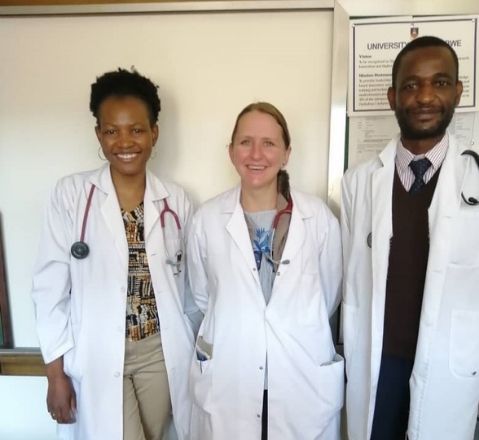Dr Pamela Gorejena-Chidawanyika is an internal medicine consultant at Parirenyatwa Group of Hospitals (PGH).
Pamela is the Harare lead for the online monthly sharing and learning sessions between University of Harare and Cambridge healthcare professionals.
My name is Pamela Gorejena-Chidawanyika. I am a University of Zimbabwe (UZ) lecturer in the Department of Primary Health Care Sciences, Internal Medicine Unit at Parirenyatwa Group of Hospitals (PGH). I specialised in internal medicine at the UZ and I am currently a consultant on one of the wards on the medical floor at PGH. PGH is one of the two tertiary referral institutions which caters for Harare residents. PGH is the largest hospital in the country with a capacity of 1800 beds and a work force of just over 2000 staff members.
Working at PGH has been both rewarding and frustrating. On one end of the spectrum, we make significant differences for many of our patients. We have some of the most experienced clinicians who offer impressive medical and surgical services, namely Dr Mbuwayesango and Dr Nemayire, who were both recently awarded the prestigious National Meritorious Award by the President for their notable contributions to the fields of Paediatric surgery and Neurosurgery respectively. However, we are limited by how much we can offer our patients due to various constrains. The challenges we face are periodic shortages of basic medical equipment for day-to-day use such as gloves and basic drugs, and limited laboratory and radiology services. We are also facing economic challenges as a country, which is contributing to poor remuneration of health care workers in the public sector. This has led to poor morale amongst the health workers with a sizeable number emigrating to other countries where they are better remunerated. Due to the high prevalence of HIV/AIDS, a sizeable number of the patients have opportunistic infectious diseases. Despite our challenges, we manage to utilise our clinical skills and our limited resources in coming up with plausible diagnoses and treatment plans for most of our patients.
Like in many places around the world, the COVID-19 pandemic has added more pressure to the health care sector. The hospital management has had to pool our limited resources to care for COVID-19 patients as well as the non-COVID patients. My experience in the non-COVID (‘green-zone’) is that we are seeing complications of inadequate follow-up and care of those with chronic diseases like hypertension, diabetes mellitus, HIV/AIDS etc… which is an unfortunate but an expected outcome of this pandemic. One positive consequence of this pandemic has been the fostering of partnerships which has led to improved care of COVID-19 patients with ultimately better outcomes.
I found out about Cambridge Global Health Partnerships (CGHP) through our internal medicine unit co-ordinator (Dr Ngwende) who encouraged me to get involved in this program given my interest in infectious diseases. Our Faculty and Master of Medicine in internal medicine (MMed[1]) students have benefited immensely from the monthly case study sessions between us and the team at Cambridge University Hospitals, facilitated by CGHP. My role in these learning sessions has been to co-ordinate the monthly presentations with the assistance of two of our senior registrars (Dr Lindsey Robertson and Dr Nickson Mukapa), who have shown an interest in continuous medical education and infectious diseases. It has been a very enriching and enjoyable experience for not only myself, but also all the MMeds and members of the internal medicine unit, who have also been attending these sessions.
What we have experienced is a true global health infectious disease perspective. We have benefited immensely with regards to best management practice for COVID-19 patients. We have also realised that the scope of infectious diseases goes beyond management of HIV/AIDS and related illnesses, which we have become accustomed to managing. I have also come to realise that despite our different jurisdictions and experiences, some of our challenges with regards to patient management are very similar. I surely hope we can continue to maintain this partnership for the benefit of our MMeds and open up possibilities for research or specialist clinical training in infectious diseases. My aim is that we can ultimately develop an infectious disease centre of excellence through funding and provide programs to train fellows in research or to further clinical studies in this field. We may certainly have the experience in managing HIV and HIV related diseases, but COVID-19 has alerted us of the need for a robust infectious disease unit. This partnership will benefit me immensely because it speaks to what I have always wanted to do; that is to pursue a career in research and ultimately consider postgraduate training in global health or infectious diseases.
[1] The MMeds are Masters students in Internal Medicine. They go under the title – ‘Registrar’. Upon completion of their 4 years of training, they become ‘Senior registars’ for a year before they are officially signed off to become independent Physicians and consultants trained in Internal Medicine. At this point they can opt to further their studies and subspecialise or continue working as General Internal Medicine Physicians either in private or in the public hospital or both.
Return to case studies

